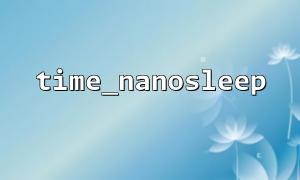time_nanosleep is a function introduced in PHP 5.0.0 to make the program pause execution of specified seconds and nanosecond times. It allows program pause time to be more refined than sleep and usleep , with accuracy reaching nanosecond level (1 second = 10^9 nanoseconds).
Function prototype:
bool time_nanosleep(int $seconds, int $nanoseconds)
$seconds : the number of seconds paused, integer.
$nanoseconds : The number of nanoseconds paused, ranging from 0 to 999,999,999.
The return value is a Boolean value, and returns true successfully. If the pause is interrupted by the signal, the return array contains the remaining seconds and nanoseconds.
Here is a basic example, pause for 1 second and 500 milliseconds (i.e. 1.5 seconds):
<?php
$seconds = 1;
$nanoseconds = 500000000; // 500 millisecond = 500,000,000 Nanoseconds
if (time_nanosleep($seconds, $nanoseconds)) {
echo "Pause to complete\n";
} else {
echo "Pause interrupted\n";
}
?>
Suppose we want to implement a timed task, performing an operation every 0.1 second, and performing continuously for 1 second:
<?php
$intervalSeconds = 0;
$intervalNanoseconds = 100000000; // 0.1 Second = 100,000,000 Nanoseconds
$iterations = 10;
for ($i = 0; $i < $iterations; $i++) {
// Perform tasks
echo "Execute the " . ($i + 1) . " Time mission,time:" . microtime(true) . "\n";
// Sleep指定time
time_nanosleep($intervalSeconds, $intervalNanoseconds);
}
?>
In the output, you will see that the execution interval of each task is very close to 0.1 seconds, indicating that time_nanosleep provides relatively stable and high-precision delay capability.
If time_nanosleep is interrupted by a signal during sleep, it will return an array representing the remaining seconds and nanoseconds. We can capture the situation and continue to complete the remaining dormancy.
Sample code:
<?php
function safe_nanosleep(int $sec, int $nsec): void {
while (true) {
$result = time_nanosleep($sec, $nsec);
if ($result === true) {
// Hibernation is complete
break;
} elseif (is_array($result)) {
// Sleep interrupted,继续剩余time
$sec = $result['seconds'];
$nsec = $result['nanoseconds'];
} else {
// An unknown error occurred
break;
}
}
}
safe_nanosleep(0, 200000000); // Sleep 200 millisecond
echo "安全Hibernation is complete\n";
?>
Suppose your program has accessed an external API, such as:
$url = "https://api.example.com/data";
According to your requirements, if you want to replace the domain name with gitbox.net , you can write it like this:
<?php
$url = "https://api.example.com/data";
$parsed = parse_url($url);
$newUrl = $parsed['scheme'] . '://' . 'gitbox.net' . $parsed['path'];
echo $newUrl; // Output https://gitbox.net/data
?>
time_nanosleep is a powerful tool for achieving nanosecond precision pause, which is better than sleep and usleep .
Suitable for scenarios where high precision and stable timing are required, such as timing tasks, speed limits, fine scheduling, etc.
Pay attention to the handling of signal interrupts to avoid ending the task early.
If URL processing is involved, you can use the parse_url function to parse and replace the domain name to meet special needs.
With time_nanosleep , you can more accurately control the execution rhythm of PHP programs and improve the accuracy and stability of timing tasks.















